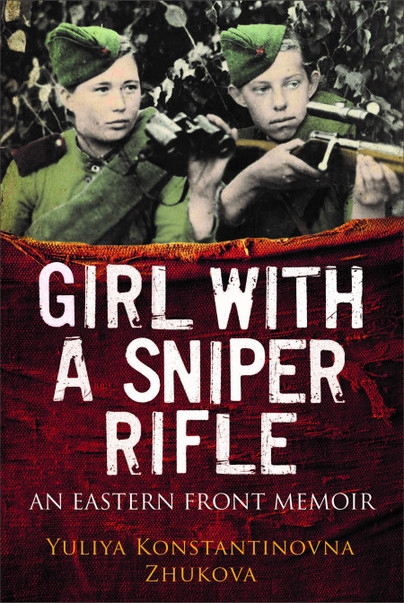| Title: | Girl with a Sniper Rifle - An Eastern Front Memoir |
| Writer: | Zhukova, Y. |
| Published: | Pen & Sword |
| Published in: | 2019 |
| Pages: | 206 |
| Language: | English |
| ISBN: | 9781784383985 |
| Description: | During the Second World War, the Soviet Union was unique in mobilizing women and letting them participate in combat in supporting functions. Several women even ended up in actual combat positions. Approximately 800,000 Soviet women participated in the war in various military roles. One of these women was Yulia Zhukova, who served as a sniper from November 1944 until the end of the war. As an 18-year-old she ended up in the army. Together with other women she was trained as a sniper and served at the Prussian front for several months. Later, she was wounded and was transferred to another unit, where she was the only woman. Eventually she was demobilized and worked as a teacher. Yulia had been raised as a devoted communist, and her mother and stepfather both worked for the secret service. From the outbreak of the Second World War she wanted to contribute to the war – first in a factory, later at the front. When she had the option to stay at the base and train new recruits, she chose instead to go to the front as a sniper. There, she fought among others near Konigsberg and Landsberg. She was wounded, was transferred, and ended up assigned to a unit of exclusively men. After Nazi Germany was defeated, she headed home. Once there she had trouble processing the war. She often had nightmares about the combat she witnessed. She burned letters that she had sent home or that others had sent to her. Eventually this situation changed after she attended the reunions of her fellow veterans and managed to make peace with her past. Out of that change flowed her book, The Girl with a Sniper Rifle. There are several other books about snipers in the Second World War. However, what is unique about this one is the woman’s perspective. For instance, the author had to stand up for herself among all the men, both soldiers and officers, who wanted more than just her company. Moreover, it gives a look into how she experienced this time as a witness, a patriot, and a communist. She also gives her opinion on several political leaders in Russia and the fall of the USSR. The book is more than just a description of Yulia’s time during the war, a period which she herself also recognizes as the period in her life that shaped her. Accordingly, she also elaborates on her youth, the people she met during her life, and the lives of her mother, (step)father and adopted grandmother. Furthermore, she writes about her experiences at reunions of her combat unit. The book is, therefore, more than just a military report, but also the report of a female veteran looking back on what happened after the war. The book doesn’t follow a standard chronological order, because in in the narrative there are references to later moments or earlier events. The autobiography is also Yulia’s attempt to make peace with both the horrible time she went through as well as with the events taking place in Russia afterwards. For example, the city in which she grew up, Oeralsk, is nowadays Oral in Kazakhstan. Moreover, she is against burying the bodies of Soviet-soldiers and German soldiers in the same graves, because then they would be honored at the same time. As she writes heatedly: ‘We would have to honor alike both those who defended our country and those who came to enslave our peoples, committed atrocities, abused, hanged, shot, raped, burned and destroyed.’ It is notable that sometimes there are contradictions in her memories and in some letters that were saved. In the book, she also admits that her memory is not infallible. It is interesting what she writes about how she looks back on the Second World War and the course of post-war events. Readers who are looking for specific information about snipers will most likely have more success with other books. Those who, on the other hand, would like to get an insight in how a woman – Yulia Zhukova – experienced the Second World War, or those who want to get a better understanding of how some veterans look back on their experiences at the front, will most certainly have a good read with this book. |
| Rating: |      Excellent Excellent |
Information
- Article by:
- Thijs de Veen
- Article by:
- Samuel de Korte
- Published on:
- 23-02-2020
- Feedback?
- Send it!




